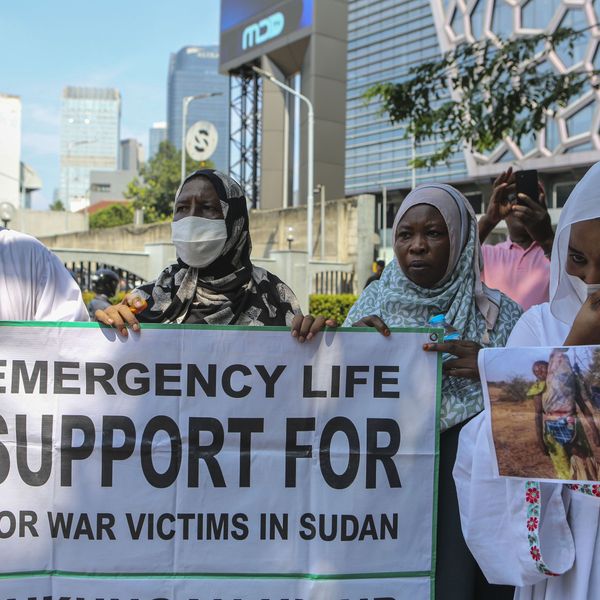War in Afghanistan Worsening for Civilians: ICRC
Outgoing outgoing head of the ICRC's delegation in Afghanistan describes humanitarian crisis
The U.S.-led war in Afghanistan has brought a humanitarian crisis for civilians and diminished hopes for the future, the International Committee of the Red Cross (ICRC) stated on Monday.
Reto Stocker, the outgoing outgoing head of the ICRC's delegation in Afghanistan, made the statements in Kabul a day after the war began its 12th year, describing a worsening situation for civilians, and said he is "filled with concern" upon his departure.
"Since I arrived here in 2005, local armed groups have proliferated, civilians have been caught between not just one but multiple front lines, and it has become increasingly difficult for ordinary Afghans to obtain health care," said Stocker.
Stocker said civilians' access to health care has been repeatedly limited by the war.
"There have to be some things that are off limits, and interfering with health care is one of them. Attacks on health-care staff, vehicles and facilities cannot be considered part of the ordinary conduct of war. Health care must remain available to everyone who needs it. It must be provided impartially, on the basis of medical considerations only."
Stocker describes a grim future for Afghan civilians, as they face a plethora of disaster. "People are not just suffering the effects of the armed conflict. Hardship arising from the economic situation, or from severe weather or natural disaster, has become more widespread, and hope for the future has been steadily declining."
An Urgent Message From Our Co-Founder
Dear Common Dreams reader, The U.S. is on a fast track to authoritarianism like nothing I've ever seen. Meanwhile, corporate news outlets are utterly capitulating to Trump, twisting their coverage to avoid drawing his ire while lining up to stuff cash in his pockets. That's why I believe that Common Dreams is doing the best and most consequential reporting that we've ever done. Our small but mighty team is a progressive reporting powerhouse, covering the news every day that the corporate media never will. Our mission has always been simple: To inform. To inspire. And to ignite change for the common good. Now here's the key piece that I want all our readers to understand: None of this would be possible without your financial support. That's not just some fundraising cliche. It's the absolute and literal truth. We don't accept corporate advertising and never will. We don't have a paywall because we don't think people should be blocked from critical news based on their ability to pay. Everything we do is funded by the donations of readers like you. Will you donate now to help power the nonprofit, independent reporting of Common Dreams? Thank you for being a vital member of our community. Together, we can keep independent journalism alive when it’s needed most. - Craig Brown, Co-founder |
The U.S.-led war in Afghanistan has brought a humanitarian crisis for civilians and diminished hopes for the future, the International Committee of the Red Cross (ICRC) stated on Monday.
Reto Stocker, the outgoing outgoing head of the ICRC's delegation in Afghanistan, made the statements in Kabul a day after the war began its 12th year, describing a worsening situation for civilians, and said he is "filled with concern" upon his departure.
"Since I arrived here in 2005, local armed groups have proliferated, civilians have been caught between not just one but multiple front lines, and it has become increasingly difficult for ordinary Afghans to obtain health care," said Stocker.
Stocker said civilians' access to health care has been repeatedly limited by the war.
"There have to be some things that are off limits, and interfering with health care is one of them. Attacks on health-care staff, vehicles and facilities cannot be considered part of the ordinary conduct of war. Health care must remain available to everyone who needs it. It must be provided impartially, on the basis of medical considerations only."
Stocker describes a grim future for Afghan civilians, as they face a plethora of disaster. "People are not just suffering the effects of the armed conflict. Hardship arising from the economic situation, or from severe weather or natural disaster, has become more widespread, and hope for the future has been steadily declining."
The U.S.-led war in Afghanistan has brought a humanitarian crisis for civilians and diminished hopes for the future, the International Committee of the Red Cross (ICRC) stated on Monday.
Reto Stocker, the outgoing outgoing head of the ICRC's delegation in Afghanistan, made the statements in Kabul a day after the war began its 12th year, describing a worsening situation for civilians, and said he is "filled with concern" upon his departure.
"Since I arrived here in 2005, local armed groups have proliferated, civilians have been caught between not just one but multiple front lines, and it has become increasingly difficult for ordinary Afghans to obtain health care," said Stocker.
Stocker said civilians' access to health care has been repeatedly limited by the war.
"There have to be some things that are off limits, and interfering with health care is one of them. Attacks on health-care staff, vehicles and facilities cannot be considered part of the ordinary conduct of war. Health care must remain available to everyone who needs it. It must be provided impartially, on the basis of medical considerations only."
Stocker describes a grim future for Afghan civilians, as they face a plethora of disaster. "People are not just suffering the effects of the armed conflict. Hardship arising from the economic situation, or from severe weather or natural disaster, has become more widespread, and hope for the future has been steadily declining."

